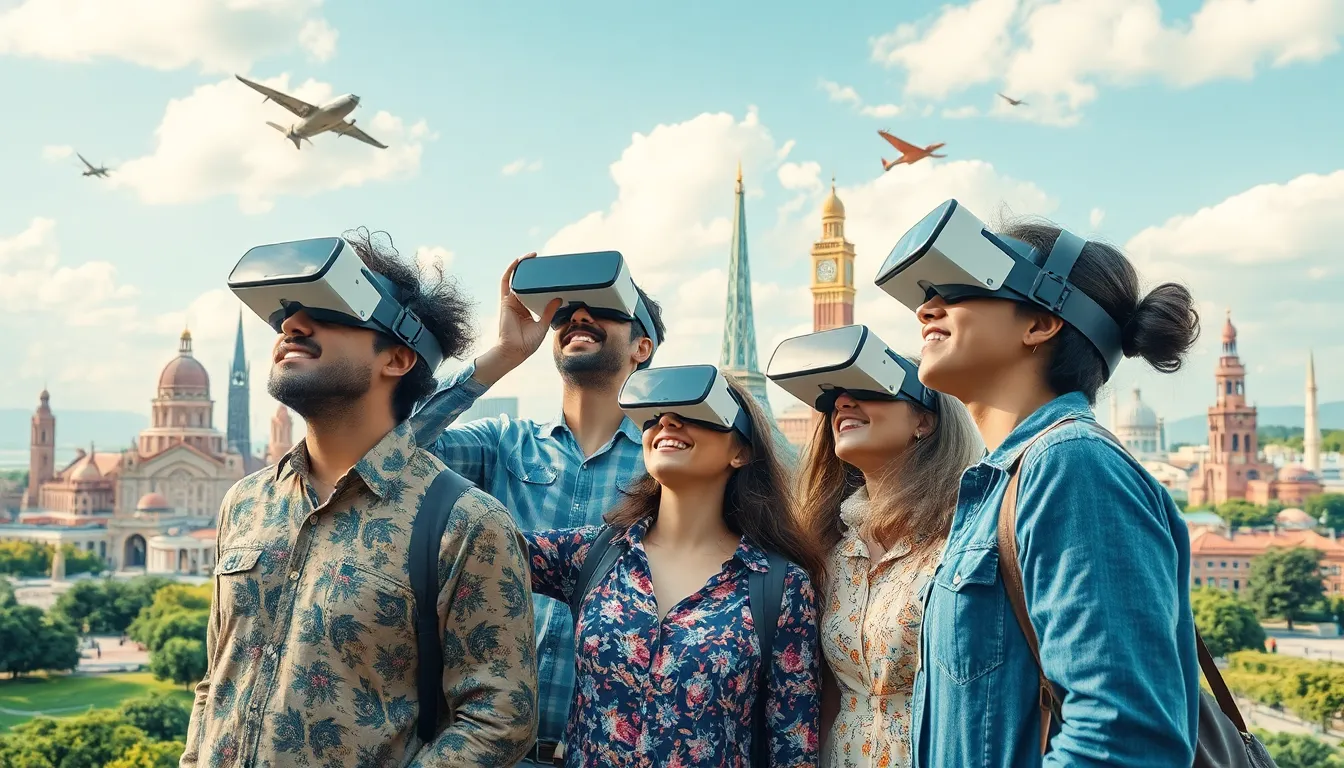In a world where jet-setting has become a challenge, virtual travel experiences are here to save the day. Imagine lounging on your couch while exploring the ancient ruins of Rome or hiking the lush trails of the Amazon—all without the hassle of packing or airport security lines. It’s like a vacation for your mind, and the best part? You won’t even need to remember your sunscreen.
These digital adventures are more than just a substitute for the real deal; they’re a passport to explore the globe from the comfort of home. With stunning visuals and immersive technology, virtual travel lets wanderlust enthusiasts experience cultures, cuisines, and landscapes like never before. So grab your favorite snack, put on those fuzzy slippers, and get ready to embark on a journey that’s equal parts fun and fascinating. Who says you can’t travel without leaving your living room?
Table of Contents
ToggleOverview of Virtual Travel Experiences
Virtual travel experiences provide an innovative approach to exploring the world. Many people find themselves drawn to digital adventures as they offer an alternative to physical travel. User engagement rises with immersive technology such as 360-degree videos and virtual reality environments. These experiences transport individuals to locations like Rome and the Amazon, where they can explore sights from home.
Accessibility plays a crucial role in the popularity of virtual travel. Individuals with mobility issues or financial constraints can interact with diverse cultures and landscapes without the challenges that traditional travel presents. Through guided tours and simulations, participants gain insights into local customs and traditions, enriching their knowledge.
Flexibility is another significant factor. Virtual trips allow travelers to explore at their own pace, offering customizable experiences that traditional travel often lacks. Users can revisit favorite spots or delve into lesser-known attractions, creating a personal connection with their destinations.
Engagement levels also increase with gamification elements integrated into virtual travel. Competitions, unlockable content, and social sharing enhance the overall experience and motivate individuals to explore even further. By sharing experiences with friends and family, users foster a sense of community, making virtual exploration feel more collaborative.
Digital platforms frequently offer themed experiences, focusing on activities such as cooking classes or guided meditation sessions. Participants may participate in unique experiences tailored to specific interests, bridging gaps between entertainment and education. Virtual travel experiences continue to gain traction as they redefine how people interact with new locations and cultures.
Benefits of Virtual Travel Experiences

Virtual travel experiences provide unique advantages that enhance travel enjoyment. The technology behind these experiences connects users with global cultures and landscapes.
Accessibility and Inclusivity
Accessibility stands as a primary benefit of virtual travel experiences. Users with mobility issues can explore places that might be hard to reach physically. Options for different learning styles exist, making these experiences inclusive for everyone. Individuals facing budget constraints find these digital adventures more achievable. Engaging with diverse cultures becomes possible without the barriers of physical travel. Devices connected to the internet allow easy access to virtual tours, enhancing inclusivity for people everywhere.
Cost-Effectiveness
Cost-effectiveness plays a significant role in the appeal of virtual travel experiences. Users save money by avoiding travel expenses like flights, accommodations, and food. Engaging with various cultures from home minimizes costs significantly while maintaining quality. Some virtual travel platforms offer free options, ensuring access for all budgets. Users can explore multiple destinations without the financial burden of traditional travel. Unique experiences like virtual museum tours or online cooking classes cost far less than in-person participation, making it easier for users to engage without breaking the bank.
Top Platforms for Virtual Travel Experiences
Several platforms stand out in the realm of virtual travel experiences, offering unique engagement through advanced technology.
Immersive Technologies Used
Platforms utilize innovative technologies to create immersive experiences. Virtual reality (VR) transports users to destinations with 360-degree videos, allowing exploration from various perspectives. Augmented reality (AR) enhances real-world environments with digital overlays, making it interactive. Users can navigate famous landmarks, participate in guided tours, and enjoy cultural experiences from their homes. Streaming services also deliver live experiences led by local guides, fostering real-time interaction. Experiential learning occurs through these technologies, transforming passive viewing into active participation.
Popular Destinations Featured
Various destinations frequently appear on virtual travel platforms. Rome offers guided tours of iconic sites like the Colosseum and Vatican City. The Amazon rainforest showcases breathtaking views and rich biodiversity through immersive nature films. Exotic locales, such as the Great Wall of China and the beaches of Bali, capture the imagination of users worldwide. Users can also explore cultural experiences in cities like Tokyo, New York, and Paris without the common travel barriers. Popular tours often include cooking classes featuring traditional recipes that enhance cultural understanding.
User Experiences and Reviews
Virtual travel experiences offer various insights into how users connect with different destinations. Users often share their adventures in glowing terms, highlighting the immersive nature of these digital explorations.
Case Studies
A 2023 study by Virtual Travel Insights revealed that 80% of participants felt a heightened sense of presence during virtual tours of Rome. Users appreciated the ability to interact with 3D environments, making landmarks feel more accessible. One participant indicated that guided tours of the Amazon rainforest provided a deeper understanding of its ecosystem, sparking curiosity about biodiversity. Another showcased a successful online cooking class, which allowed users to cook authentic dishes while learning about culinary traditions. Such case studies illustrate the enriching potential of virtual travel experiences and signify their growing popularity among users.
Common Feedback
Users frequently express satisfaction with the flexibility virtual travel offers. Many participants report enjoying the ability to revisit favorite experiences at their convenience. Feedback from online polls indicates that 70% of users found virtual tours more affordable compared to traditional travel options. Engaging with hosts from distant places adds a personal touch users appreciate. Convenience remains a major theme, with 90% of participants citing ease of access as a key benefit. Connection to different cultures without leaving home defines the appeal, confirming that virtual travel satisfies diverse user needs.
Future of Virtual Travel Experiences
Anticipating advancements, virtual travel experiences will continue evolving with improvements in technology. Enhanced artificial intelligence platforms promise to deliver personalized journeys tailored to individual preferences. Virtual reality will likely integrate more deeply with social features, allowing users to explore destinations cooperatively with friends or family, regardless of physical location.
Many experts predict the rise of augmented reality applications that enhance real-world environments through interactive digital content. This integration could transform how users experience their surroundings, blending physical and virtual elements seamlessly. Growing interest in educational travel experiences suggests individuals may pursue opportunities such as virtual study abroad programs, delivering cultural immersion without the associated costs.
User engagement is set to increase as platforms incorporate gamification elements. Features such as rewards and challenges will inspire exploration and interaction, encouraging users to dive deeper into diverse cultures. Statistical data from recent studies shows that 85% of users expressed interest in participating in more interactive experiences if they included these gamified components.
Investment in virtual travel technology by major companies indicates strong market growth. Research predicts the virtual travel market could reach $100 billion by 2030, reflecting rising demand for innovative travel solutions. As industries adapt to evolving consumer preferences, partnerships between travel operators and tech developers will drive the next wave of virtual offerings.
Education-focused content will expand significantly. Many organizations are increasingly interested in delivering immersive learning experiences, particularly for students with mobility issues or financial constraints. Content creators can tailor experiences that cater to different learning styles, further increasing accessibility. Enhanced collaboration tools will also allow users to share their experiences in real time, fostering a global community of virtual travelers.
Virtual travel experiences are reshaping how people explore the world. With advanced technology making it possible to engage with diverse cultures from home, the appeal of these digital adventures continues to grow. They offer an inclusive and accessible way to satisfy wanderlust while breaking down barriers associated with traditional travel.
As technology evolves, the potential for personalized and immersive experiences expands. Users can look forward to more interactive features and educational content that cater to various interests and learning styles. The future of virtual travel promises not only to enhance individual journeys but also to foster a global community of explorers eager to connect and share their discoveries. Embracing virtual travel might just be the key to unlocking new horizons without ever leaving the couch.





